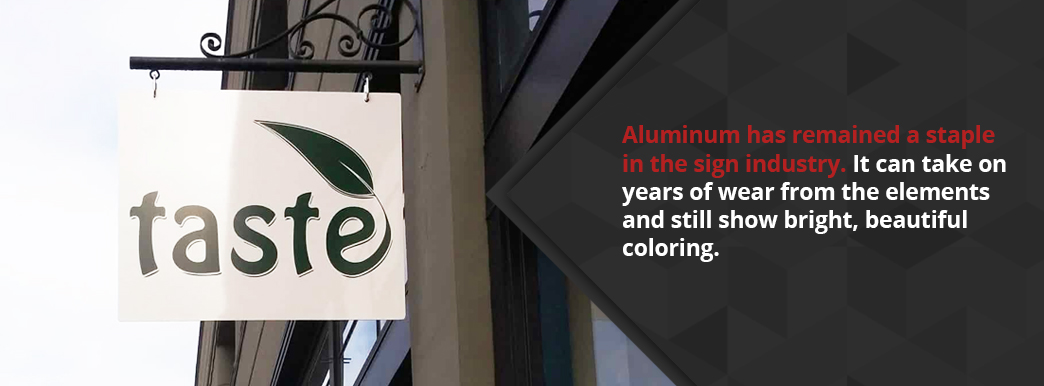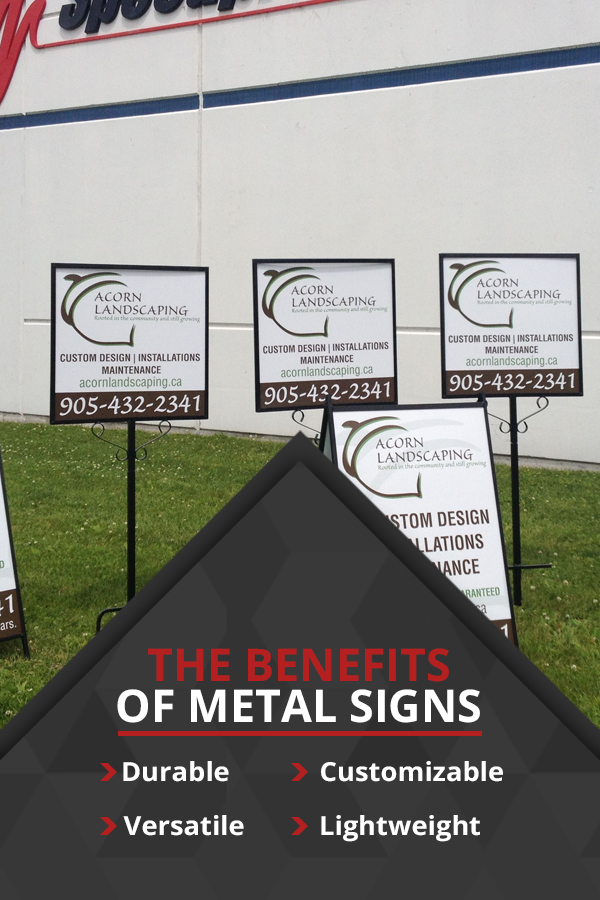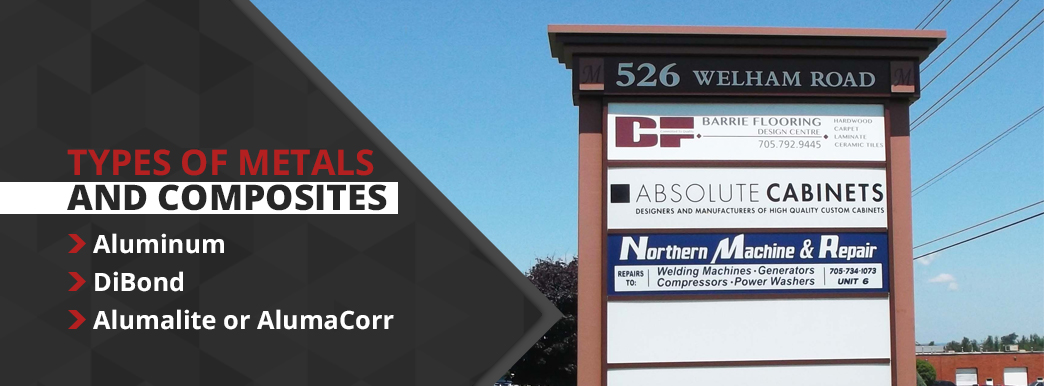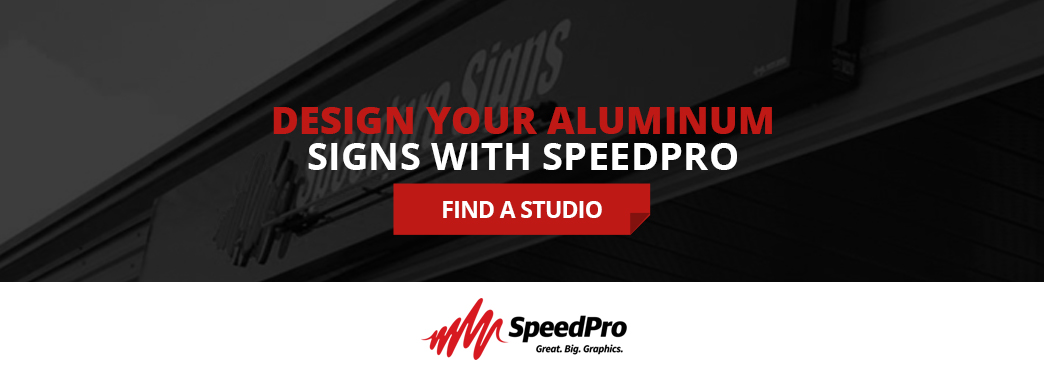Signage is an essential part of how businesses operate. There’s the company name on the front of your building, interior signs to direct customers to the right rooms, designation placards in your parking lot, advertising boards around the local area and many more applications. With so many different needs, you should get the right materials for every type of sign.
Outdoor signage can pose an issue of longevity. Without the correct base, your advertisement or company name could take on weather damage, making it illegible or unattractive. Using aluminum and polymetal boards as your base will ensure your designs last years, even if they stay outside in every season.
What Are Aluminum and Polymetal Signs?
Aluminum has remained a staple in the sign industry. It can take on years of wear from the elements and still show bright, beautiful coloring. Aluminum is a lightweight material that is heated and extruded — or pushed through a shaped die — into flat, thin sheets. These sheets are cut and used for a multitude of purposes, including outdoor signage. The material comes in several colors, but is also receptive to paint, printed inks and finishes.
Polymetal is a composite version of sign board, meaning it uses a lightweight, non-metal core as a stabilizer and two thin panels of aluminum on either side for decorative purposes. Typically, polymetal is much stronger and more lightweight than the classic extruded aluminum. Manufacturers use various types of chemically engineered plastic to create the core, meaning it will never take on water damage and will last long-term in outdoor conditions.
Each of these materials is customizable with cutting and routing, so you can turn a rectangular board into whatever shape you need. You can round out corners, cut out circular signs, use routing tools to cut out and replace letters or design a specialty shape, such as the outline of a logo or mascot face. With aluminum, you’ll have very few limitations — this makes it one of the most popular sign materials.
The Benefits of Metal Signs
When you’re mulling over what type of material to use for your sign needs, consider aluminum one of the top contenders. It’s widely used by small and large businesses alike, as using sheet metal or composites for signage is beneficial to any company. Aluminum and polymetals are:
- Durable: Both extruded aluminum sheet metal and composite boards are extremely durable. They are weather and fire resistant and will last for years at a time, even in harsh conditions and throughout multiple seasons. Because they assemble from chemical plastics and metal, neither extruded aluminum nor composites are susceptible to rot, deterioration, peeling, cracking or any other form of environmental damage. They may bend, but only with a lot of pressure or weight. This means you won’t have to worry about replacing your signs anytime soon.
- Versatile: The durability of aluminum makes it perfect for both indoor and outdoor applications. You can create signs of any size, from large, wall or roof mounted signs for your building, to small door or parking placards. If you want to create a cohesively branded workspace, you can make the interior and exterior signs of your office building match. It’s also receptive to several kinds of coloring and design, including paint, glossy and matte finishes, directly printed inks cured with UV or solvents, vinyl overlay, capping and several other options. Using aluminum means your design will be bright, beautiful and clear, even from far distances.
- Customizable: With the right tools, or by partnering with a quality sign business, you can easily customize aluminum materials. While they are durable, they remain relatively malleable, so you can cut them into shapes, use a router to punch out letters or even bend signs around walls. Extruded aluminum sheets come in several different colors and finishes, and you can put any design you want on the metal sign face, from a logo or graphic to a quote. You can also have the aluminum shaped into decorative designs for walls and colored to accentuate another sign or channel lettering.
- Lightweight: Despite being made entirely or partially of metal, aluminum is very lightweight. Polymetal composite boards weigh even less than signs made entirely of aluminum, as the core material is plastic. But this doesn’t affect the material’s integrity, as composites are often stronger than straight aluminum. Because they weigh so little, aluminum signs are easy to install and transport. This can be a huge advantage for businesses like real estate companies, where they need to move sale signs often.
On top of all of those advantages, aluminum and polymetal signs are relatively affordable, so you won’t break the bank if you need multiple signs. The more customizations you add, the more it will inevitably cost, but you’ll still come out with a reasonable price. Ultimately, it depends mostly on the type of material you choose.
Types of Metals and Composites
When you look for the right base for your needs, you’ll notice there are several options for aluminum sign board materials. Classic aluminum sheet metal is one of the most widely used, but there are also several forms of composite panels. Composites are a combination of aluminum sheets and a lightweight core, allowing them to be thicker and more durable while remaining easily maneuverable.
Before you decide on one type, you should compare the details and specifics of each variety. Depending on your needs, one material may suit the project better than the other options. While they are all perfectly suited for long-term outdoor and indoor uses, each variety has different compositions and standards in terms of weight, color, size, finish, printing and applications.
Weighing the differences will help you figure out which style fits your needs best. The top three most common and versatile options include:
1. Aluminum
Many exterior signs consist of aluminum sheet material. From real estate signs to custom parking space indicators, this material is versatile. It’s lightweight, making transport and relocation easy. Despite being the thinnest metal medium, aluminum signs are durable and stand up to natural wear and outdoor elements.
Thinner weights can stand alone as lawn signs or other transferable types, while thicker varieties work better for mounting on flat surfaces with screws, such as an exterior wall of your business. While still thin in comparison to other metal types, the heavier weight will prevent bending or warping over time.
Here are some of the specifics of aluminum sheet material and the options you have when ordering a custom outdoor metal sign:
- Weight: Aluminum signs are available in several thicknesses, including .032-, .040-, 0.050- and .080-inch weights.
- Size: Typically, aluminum comes at a standard size of 4-by-8-foot sheets. In some cases, certain colors of aluminum are available in 5-by-10 and 4-by-10-foot sheets. They also come in several sizes as blank, pre-cut sheets.
- Colors: While individual suppliers offer different colors, aluminum is available in white, black, yellow, red, green, blue and ivory, as well as other specialty colors.
- Finish: Aluminum panels automatically finish as gloss, but you can order a matte finish with certain colors. They are usually either direct printed or covered with a vinyl overlay.
- Applications: Versatility is this material’s strong suit. Parking and traffic signs, exterior building signs, frame inserts and custom logo signs are frequently aluminum. It can be routed into custom shapes, so you can create a unique design.
Aluminum is potentially the most commonly chosen material and one of the most versatile. As an added bonus, you can frame your board with aluminum extrusions for signs, typically in the form of angles and channels. They’ll help with wall mounting and creating a visually attractive edge without leaving sharp sheet metal exposed.
Whether you’re looking to advertise, place helpful directional markers or invest in a new company sign, you can’t go wrong with classic aluminum.
2. DiBond
DiBond® is a type of composite that is about ten times stronger than aluminum material alone, but not the most durable alternative. It’s comprised of a solid but lightweight polyethylene core between two thin sheets of aluminum. This configuration makes the panels about half as heavy as standard aluminum sheets, despite being thicker.
The core makes DiBond material great for mounting, weather resistance in outdoor uses and staying flat without bowing or bending over time. Routing and returning and roll-forming are all viable modifications, making it a perfect material for custom cut metal signs. As an added bonus, DiBond is self-extinguishing in case of fire.
Here are some of the specifics to consider regarding DiBond aluminum composite and its features:
- Weight: The most common available weights are 3mm and 6mm, but suppliers may offer other thicknesses as well.
- Size: DiBond is available in 4-by-8, 4-by-10 and 5-by-10-foot sheets. Depending on the supplier, you may get pre-cut sizes in stock.
- Colors: This material comes in white, black, yellow, red, green, blue, brushed silver and brushed gold, among other specialty colors.
- Finish: All styles are finished in either matte or gloss. You can choose to direct print or overlay vinyl on the sheets. However, for direct printing capability, you have to order the specific digital print version of the composite material.
- Applications: Composite material is rigid and durable while remaining soft enough for cutting and routing and is lightweight. It works well for exterior building signs and almost any application that standard aluminum has.
While it isn’t the most popular choice of sign material, DiBond is still a great choice. It’s easier to transport than standard aluminum and comes in middle-grade thicknesses, which is helpful if you’re looking for something sturdy without being bulky. If you’re looking to implement custom shapes and designs, this composite might be the way to go.
3. Alumalite or AlumaCorr
Being both affordable and extremely durable, Alumalite™ is one of the most popular composites for custom printed aluminum signs. It’s comprised of a corrugated polypropylene core — a high-density plastic — between two thin sheets of aluminum. Alumalite is as heavy as .040-inch sheet aluminum but is about 50 times stronger.
The corrugated center prevents the sheets from water absorption, swelling, corrosion, rot damage or delamination, regardless of the amount of time it’s exposed to wet conditions. Both aluminum faces are polyester painted and baked, providing a high-gloss appearance that is resistant to cracks, chips, peeling and flaking.
Here are specific product details to consider when ordering Alumalite metal signs for your business:
- Weight: The most common weights include 5mm and 10mm, but certain brands may offer different thicknesses.
- Size: Full sheets come in 4-by-8, 4-by-10 and 5-by-10-foot dimensions.
- Colors: While some suppliers stock other colors as well, Alumalite and AlumaCorr typically come in white, black, yellow, red, green and blue colors.
- Finish: These polymetals come with a gloss finish. They can also be direct printed and covered with vinyl overlay. Alumalite is an ideal material for applying UV and solvent-cured digital inks, screen print inks and paints.
- Applications: Alumalite is not the most frequently chosen material, but it works well for custom outdoor signage projects. The material has corrugated edges, so keep that in mind when deciding on a material for your needs. You can hide the corrugation with added edge-capping or trim-cap.
Alumalite composite material has a broad variety of uses and is proven to withstand heavy wear and prolonged outdoor exposure. Custom needs are no problem, as it’s easy to shape using standard cutting and routing tools or even bend around corners. With so much versatility at an affordable price point, this aluminum composite is perfect for almost any need or business.
How to Choose the Right Material
Depending on your intended uses and placements, each variety of material will be the ideal choice for different situations. You should consider every detail before settling on one type.
To help choose, consider whether your team will need to move the signs around often. For example, real estate companies need weatherproof yard signs, as they’re consistently exposed to the elements. But they also need signs lightweight enough for their team to load in a vehicle and transport to another property. For these kinds of scenarios, Alumalite may be the better option since it’s the lightest.
For larger, standalone signs, the solid core of DiBond may be an advantage in terms of stability. It’s thicker than standard aluminum and doesn’t leave room for air gaps like the corrugated plastic core of Alumalite. Since it’s a little heavier than the Alumalite, it has less potential of being carried off by any excessive wind.
You should also consider aesthetic reasons. For example, if you are looking to design custom vintage metal signs, you may want to use the classic extruded aluminum. Composites likely won’t look as authentic, and you can mount it directly on your walls.
Whatever style you choose, it’s hard to go wrong. There are so many available customizations and options within each material, giving you a lot of control over how the finished product looks. But, if you want to ensure yourself the best quality, you have to partner with a reliable sign manufacturer.
Design Your Aluminum Signs With SpeedPro
SpeedPro will help you through every stage of your signage needs, from the initial design consultation to making sure it installs properly. Our nationwide network of studios works with businesses in every industry to provide durable and attractive custom sign solutions. Each studio has a reliable team of professionals that will guide you in the right direction and help choose the best combination of options for your needs.
With the latest tech in the imaging industry, SpeedPro is fully equipped to take on any sign project. Additionally, we use latex inks and a quick dry printing process so our practices are better for the environment. Partnering with us means quality service and a quick turnaround, meaning you can have your sign cut, printed and displayed without having to wait weeks for the final result.
Get started on your project today — find your local studio to request a consultation or quote.





















